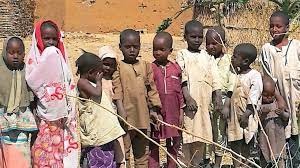The Forum for Child Rights Promotion (FORCHI) has advocated for legislative reforms, capacity building and enhanced collaboration between government and civil society organizations (CSOs) in order to combat child trafficking in Nigeria.
Addressing a press conference Monday in Abuja, International Coordinator of FORCHI, Stacey Odinakachi, said FORCHI could not remain silent in the face of such a heinous crime that robs innocent lives of their childhood and future especially as it is an organisation dedicated to the protection and promotion of the rights of children.
She said though the National Agency for the Prohibition of Trafficking in Persons (NAPTIP) under the leadership of the Director-General, Dr. Fatima Waziri-Azi, has been doing its best to tackle the menace of trafficking, a lot needs to be done.
She said: “The issue of child trafficking persists as a dark stain on our society, threatening the innocence and future of countless children. While we acknowledge the efforts undertaken by the National Agency for the Prohibition of Trafficking in Persons (NAPTIP) over the years, the gravity of the situation requires an intensified and concerted response. The statistics, though indicative, do not fully capture the enormity of the problem, as many cases remain unreported or unnoticed.
“FORCHI acknowledges the efforts made by NAPTIP in combating child trafficking. The agency has, over the years, secured convictions and rescued thousands of victims, demonstrating its commitment to eradicating this scourge. However, the persistent nature of child trafficking demands a continuous and strengthened response.
“NAPTIP’s statistics spanning from 2019 to 2022 reveal that 61% of human trafficking incidents in Nigeria occur domestically, while 39% involve cross-border trafficking. Internally, trafficking often manifests as the recruitment and transportation of children from rural areas to urban centers, subjecting them to exploitative labor conditions.
“Conversely, external trafficking targets vulnerable women who are deceived with false promises of lucrative employment in countries such as the United Arab Emirates, Oman, Italy, Libya, and Lebanon. Upon arrival, many find themselves coerced into sex work, with traffickers confiscating their passports. As a call to action, FORCHI requests the government of Nigeria to prioritize the fight against child trafficking as a national emergency. The protection of our children is a collective responsibility, and we urge all Nigerians to join hands in this crucial battle.”




